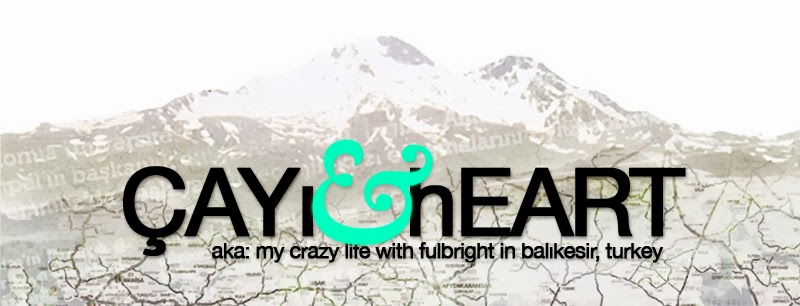Living abroad is perfect for someone like me who, despite
great intentions and a strong desire to learn a language, seem to lack the
time, consistency, and resolve to actually study said language much. Luckily for us,
words do come slowly via a process that my non-scientific self has termed osmosis. Here are a few of the words that experience has
added to my budding Turkish vocabulary thus far:
bal: honey
As in, “Balıkesir”
I live in the small city named Balıkesir, which, for the
longest time, my fellow Fulbrighters and I thought meant “fish slave or fish
captive.” What fish and POWs had in common, we had no idea, but our limited
knowledge of Turkish definitely identified “balık” as fish and Google translate
had no other definitions for “esir.” It wasn’t until we invited some of our
Turkish colleagues over for dinner that someone explained that the city name is
actually old Turkish for “place where honey flows” or something of that nature.
Much more pleasant in my opinion.
buçuk: half or 0.5, used with numbers only
As in, “Bir buçuk”
A few days into orientation in Ankara I knew the Turkish
number system and just about nothing else, so I was feeling pretty confident
when I went to try out my money-handling skills at a little convenience store
near our hotel. But then I went to checkout… and the attendant at the counter
told me my purchase rang up to “bir buçuk”… and wracking my brain as I did I
couldn’t remember for the life of me what the word ‘buçuk’ meant. So I handed
him one lira (bir lira) and then proceeded absent-mindedly search through my
change purse to buy thinking time, after a short while of which he simply took
pity on me and gestured to the 50 kuruş piece in my hand.
fıstık: literally
nut, specifically peanuts
As in, “tuzlu fıstık”
My roommate Lisa found these snacks one day when we stopped
to pick up groceries in town. They were Cheetos brand, but labeled as “fıstık,”
which our baklava buying experience told us was pistachio. Thus, when she
opened the package and we found them to be brown and peanut-like we were
confused. A colleague later explained that the word for pistachio in its
entirety is actually “antep fıstık,” as the green nuts are primarily grown in
Gaziantep. “Fıstık” alone means nut but is also the word for peanut.
tane: pieces
As in, “Üç tane
şeftali, lütfen.”
An important word to know to avoid the confusion of
produce-sellers who keep trying to give you three kilos of peaches, when you
try to explain you only want three.
tava: literally
skillet, but also deep fried.
As in, “Midye Tava”
When my roommates and I went to Ayvalık, we stopped at a
seaside restaurant hoping to split a snack on the water before finding cheaper
food elsewhere. Mussels were a local specialty so we decided to split an order.
The meze menu listed two types of
mussels “cold” and “hot” in the English translation, or “midye dolmas” and
“midye tava” in Turkish. We had tried midye dolmas— mussels stuffed with rice,
a delicious street food— before and it was a chilly night, so we opted to try
the hot mussels hoping for something a bit lighter. Thus we were all shocked
when they brought out a heaping plate of breaded and deep-fried mussels. Since
then we have been much more skeptical of the accuracy and specificity of
translated menus…
zina: adultery
As in, “Noooooo hoca! Not zzzzina…”
One of the more outspoken students in my class is a boy
named Sina, who stopped in the middle of an activity we were doing one day to
school me in pronunciation. Several students took turns explaining and
re-explaining: “No, no, no, hoca! SSSsina, not zina… Sina!” I was convinced
that was what I had called him in the first place, but they were so adamant
that I looked up the definition of the word later at the gym with my roommates
and nearly died with laughter and embarrassment.

